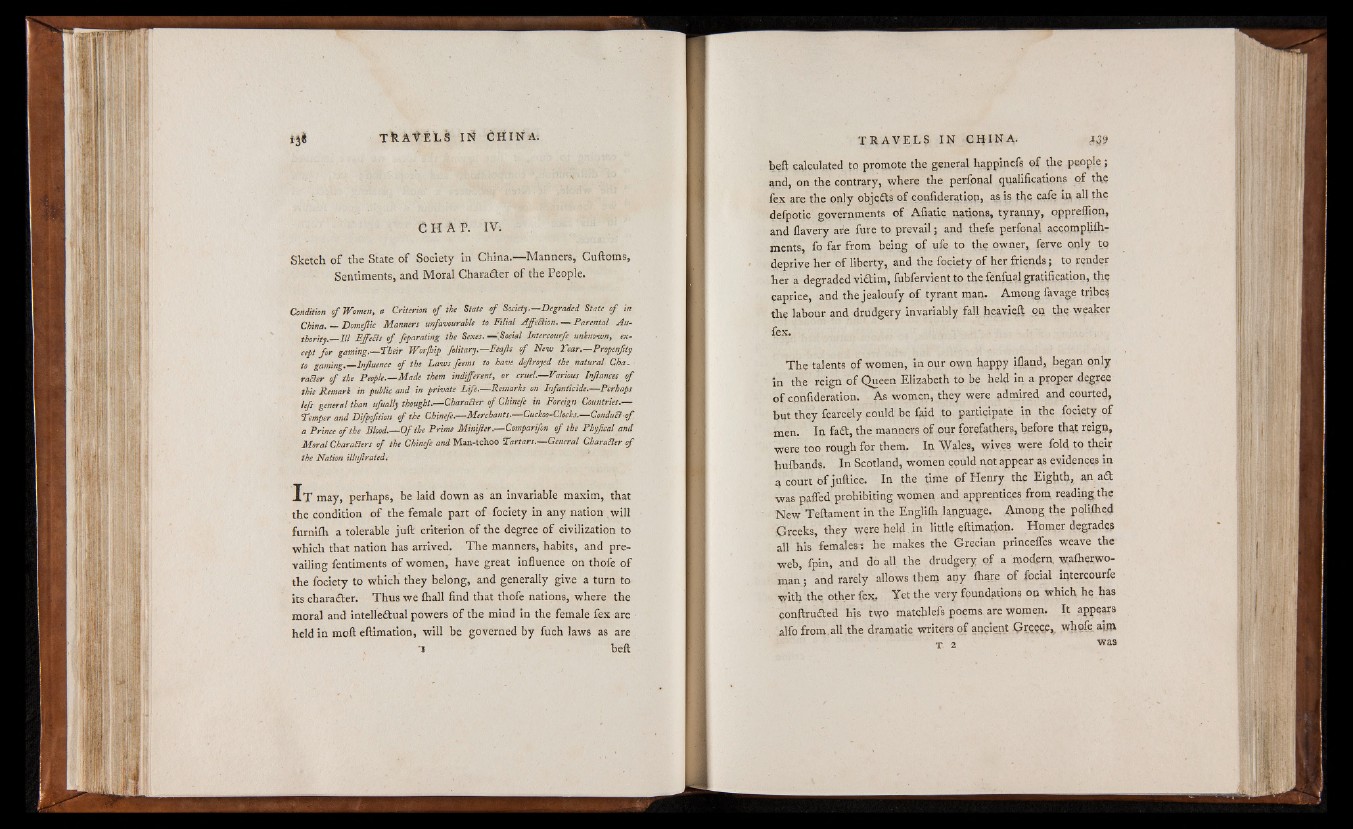
C H A P . IV.
Sketch o f the State o f Society in China.— Manners, Cuftoms,
Sentiments, and Moral Charader o f the People.
Condition of Women, a Criterion o f the State o f Society— Degraded State of in
China. — Domefic Manners unfavourable to Filial AffeBion. — Parental Authority.
III FffeBs of feparating the Sexes.— ;Social Intercourfe unknown, except
fo r gaming.— Their Worjhip felitary.— Feofs of New Tear.— Propenflty
to gaming.— Influence of the Laws feems to have defrayed the natural Cha.
racier f the People.— Made them indifferent, or cruel.— Various Inflances o f
this Remark in public and in private Life.— Remarks on Infanticide.— Perhaps
lefs general than lifually thought.— CharaBer of Chinefe in Foreign Countries.—
Temper and Difpofltion of the Chinefe.— Merchants.— Cuckoo-Clocks.— ConduBof
a Prince o f the Blood.— O f the Prime Minifler.— Comparifon o f the Phyfical and
Moral CharaBers of the Chinefe and Man-tchoo Tartars— General CharaBer t f
the Nation ilhtft rated.
I t may, perhaps, be laid down as an invariable maxim, that
the condition o f the female part o f fociety in any nation will
furniih a tolerable juft criterion o f the degree o f civilization to
which that nation has arrived. The manners, habits, and prevailing
fentiments o f women, have great influence on thofe o f
the fociety to which they belong, and generally give a turn to
its charader. Thus we ihall find that thofe nations, where the
moral and intellectual powers o f the mind in the female fex are
held in moft eftimation, will be governed by fuch laws as are
'i beft
heft calculated to promote the general happinefs o f the people;
and, on the contrary, where the perlpnal qualifications o f the
fex are the only objeCts o f confideratioti, as is the cafe in all the
defpotic governments o f Afiatic nations, tyranny, oppreffion,
and flavery are fure to prevail; and thefe perfonal accotnpMi-
ments, fo far from being o f ufe to the owner, ferve only to
deprive her o f liberty, and the fociety of her friends; to render
her a degraded vidim, fubfervient to the fcnfual gratification, the
Caprice, and the jealoufy o f tyrant man. Among favage tribes
the labour and drudgery invariably fall heavieji on the weaker
fex.
T he talents o f women, in opr own happy ifland, began only
in the reign o f Queen Elizabeth to be held in a proper degree
o f confideration. As women, they were admired and courted,
but they fcarcely could be faid to participate in the fociety o f
men. In fa d , the manners o f our forefathers, before that reign,
were too rough for them. In Wales, wives were fold to their
huibands. In Scotland, women could not appear as evidences in
a court o f juftice. In the time o f Henry the Eighth, an a d
was pafled prohibiting women and apprentices from, reading the
New Teftament in the Engliih lapgnage. Among the poliflied
Greeks, they were held in little eftimation. Homer degrades
all his females s he makes the Grecian princefles weave the
web, fpin, and do all the drudgery o f a modern, waiherwo-
man; and rarely allows them any ihare o f fOcial intercourfe
with the. other fex.. Yet the very foundations on which he has
conftruded his two matchlefs poems are women. It appears
alfo from.all the dramatic writers o f ancient Greece,, whofe amv
T 2 waS